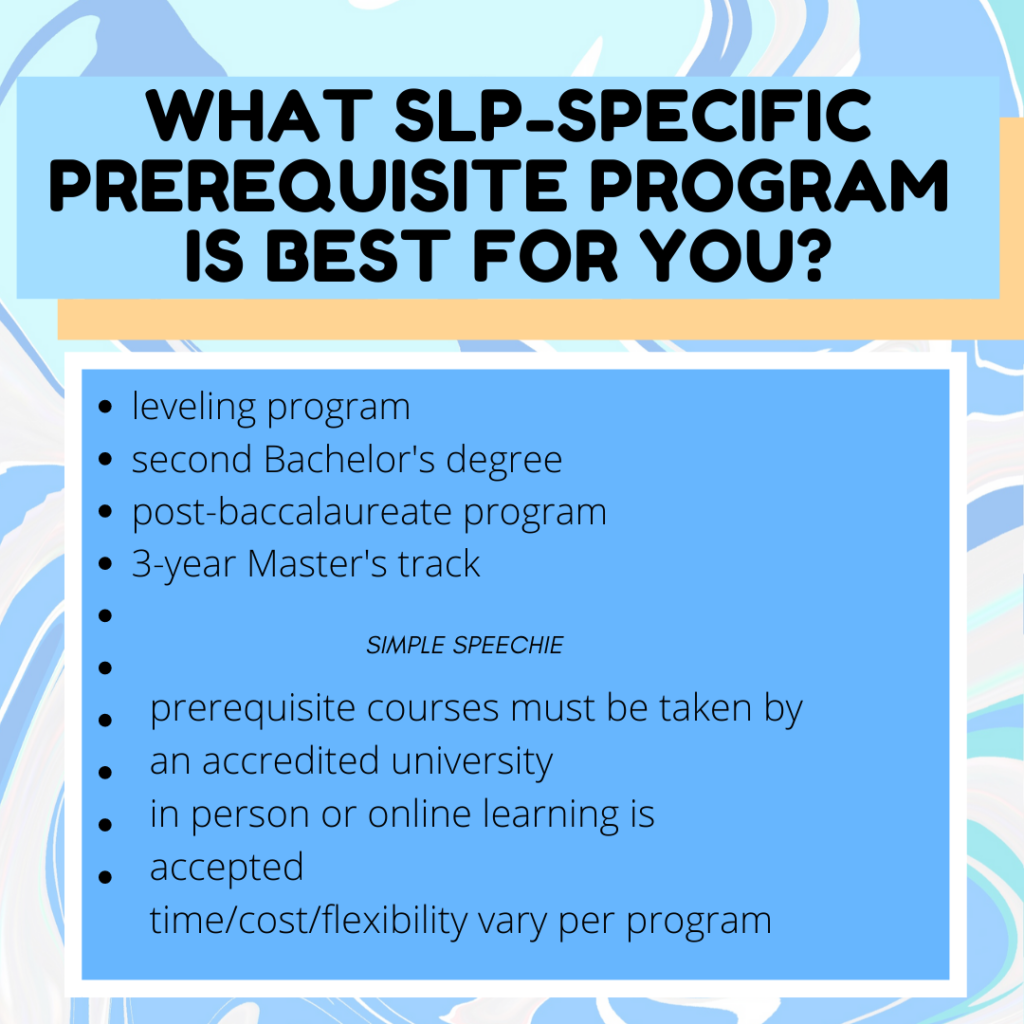
When pursuing a Master’s in SLP, you must complete SLP-specific prerequisite courses. Each SLP graduate program has its own sets of prerequisites courses. Though each SLP program has relatively similar across all programs, you must check with your program(s) of interest about their SLP coursework requirements, as it varies per program. For instance, some graduate programs require SLP-specific prerequisite courses ranging from 5 courses, up to 15 courses.
Their options to consider to meet these needs would be to complete a leveling program, a post-baccalaureate program, a second bachelor’s degree, or even apply to a 3-year track Master’s program to meet the program’s requirements. These programs can be completed through an in-person or an online platform from an accredited institution.
Every individual pursuing this field has different needs – depending on cost, time, flexibility, and your current work/life balance, you must consider which program is right for you. There is a vast array to meet your needs!

You may be wondering…
What is the difference between completing a leveling program, a post-baccalaureate program, a second bachelor’s degree, and a 3-year track Master’s?
How much does it cost?
How many courses can I take?
How long will it take me to complete my SLP-specific prerequisite requirements?
I’ve answered this below!
- Leveling programs do not require a Bachelor’s degree. They can be completed as a current undergraduate for out-of-field majors. Within a leveling program, you are allowed to take whatever courses you may need for your intended graduate programs.
- Since leveling programs are non-degree seeking programs, they are often cheaper in comparison to the other options, typically at an undergraduate rate (or even lower! I paid $550/course).
- Taking non-degree seeking courses DO NOT affect your chances of getting into a graduate program.
- Leveling programs are extremely flexible – they allow you to take as many credits as you see fit, but typically recommend no more than 4 courses per term.
- For example, if you are a freshman undergraduate and you have some spare time in the summer, you can take a few courses per summer. As a result, you would have most of the SLP-specific prerequisite courses completed by the time you apply to graduate school!
- You could also take one course per term in addition to your undergraduate academic course load if you see fit.
- Post-baccalaureate programs require the completion of a Bachelor’s degree. Post-baccalaureate programs are similar to a second Bachelor’s degree, but you earn a certificate instead of another degree. This is a non-degree seeking program, but you will earn a post-baccalaureate certificate (taking non-degree seeking courses DO NOT affect your chances of getting into a graduate program). Post-baccalaureate programs can also be identified as pre-professional or pre-SLP programs.
- Each post-baccalaureate program is designed to meet under the SLP-specific prerequisite requirements of the graduate school, but it is relatively standardized across graduate school programs. Completing a post-baccalaureate program does not guarantee acceptance into their graduate school.
- Post-baccalaureate programs often require that you go through an application process, as you may need to complete an pay an additional application fee, send in transcripts, submit a statement of purpose, and a resume.
- The cost of a post-baccalaureate program varies depending on the program you apply to (I’ve seen anywhere from $7,800-$29,000).
- Time of completion is typically around one year or it can even be less depending on how many courses you want to complete per term.
- Since leveling programs are non-degree seeking programs, they are often cheaper in comparison to the other options, typically at an undergraduate rate (or even lower! I paid $550/course).
- Second Bachelor’s degree programs award a Bachelor’s degree in communication studies and disorders (CSD). Unlike a typical Bachelor’s degree where you have to complete general education requirements, you will only take SLP-specific prerequisite coursework.
- You must take every course that is offered per term to be awarded the second Bachelor’s degree.
- Completion of a second Bachelor’s degree can range from 10-16 months.
- The cost is typically at a graduate student rate, (I’ve seen $10,000-$21,000) but it’s dependent on the program you select.
- Some programs require that you have all of the ASHA-specific prerequisite courses completed.
- Completing a second Bachelor’s degree does not guarantee acceptance into their graduate school.
- 3-year track Master’s program: You can apply to graduate school without having any leveling courses completed. Your first year on this track will consist of taking leveling courses. Then, you will enter graduate-level courses.
- If you have completed some SLP-specific prerequisite courses, you may still need to retake those courses with the program you have entered.
- Since you are entering this 3-year Master’s program, you will be paying a graduate student rate to complete your SLP-specific courses.
I considered all of these options during my last quarter of college while applying to graduate schools, and I chose to complete a leveling program. Completing a leveling program was the most financially feasible that allowed me to complete prior to graduate school, in a flexible and timely manner. To decide which leveling program qualified for the graduate programs I applied to, I reached out to every school I applied to with a copy of all the courses and description syllabi!
If you are now wondering…
- How do I know if I’m supposed to have my prerequisite courses completed before starting a program?
- How do I find out how many courses I need to take?
- What if some prerequisite courses qualify for some schools, but don’t meet the requirements for other schools?
Check out this blog post about completing prerequisites!






HI, I'M TAMMY!
I’m a graduate student at Northwestern University, the top 2 ranked speech-language pathology program.
I created this website to help students navigate their way through their educational journey by sharing my own story, providing resources, and advice. I aspire to empower students, resonate with them, and help them be successful.